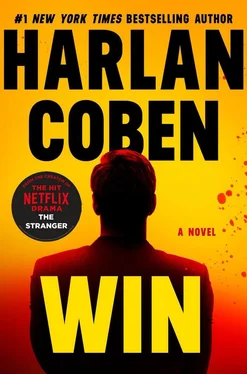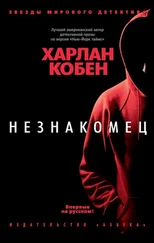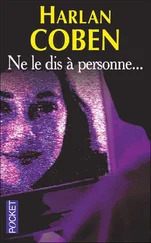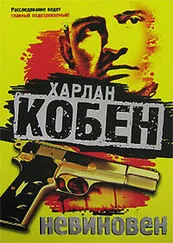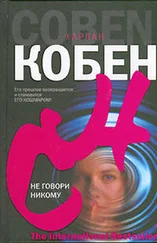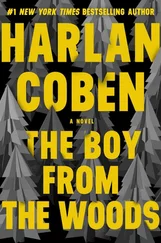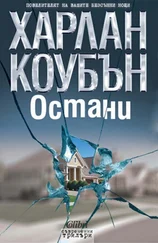I don’t gasp. I don’t bother with the inane why-didn’t-anyone-report-him line of questioning. We are a powerful family. As my father said, “money was exchanged,” often accompanied by threats both subtle and crude. It was also, as my father pointed out, a different era. That doesn’t excuse it. It puts it in context. There is a difference.
“So how does the Armitage LLC fit into this?” I ask.
My father does not do coy well. He is not an actor nor a liar. When he looks genuinely baffled by my question, I am thrown. “I don’t know what that is.”
“A shell company set up by Nigel.”
“And you think I set it up?”
“It stands to reason.”
“I didn’t.”
There is no reason to follow this line. If he denies it, he denies it. “When was the last time you saw Uncle Aldrich?”
“I don’t recall. There was a family function at Merion perhaps six or eight months before his murder. Perhaps then. But we didn’t speak.”
“How about the night before he was murdered?”
My father stops in his backswing. I have never seen him do that. Never. Once he is committed to his swing, you’d have to shoot him to stop it.
“Pardon?”
“Cousin Patricia says you were at their house the night before he died.”
“Did she?”
“Yes.”
“But I just told you that I hadn’t seen Aldrich for at least six to eight months before his murder.”
“So you did.”
“I would call that a conundrum.”
“I would as well.”
My father strolls back to the house. “Good luck with that.”
Sir Arthur Conan Doyle, through his legendary character Sherlock Holmes, said, “Once you eliminate the impossible, whatever remains, no matter how improbable, must be the truth.”
I am thinking about this quote, even though it is not fully apropos to the situation. Based upon what I am learning — and assuming I believe that my father is telling the truth about not setting up the shell company — the answer as to the creator of Armitage LLC becomes rather obvious.
My grandparents.
Sexism has always ruled, of course, but whenever you see a family like ours, a family that has managed to hang on to its power and prestige across generations, the hoary, patronizing chestnut of “Behind every successful man there is a woman” doth usually apply. When my grandfather died, it wasn’t my father who stepped up, except perhaps in a ceremonial manner.
My grandmother ran the show.
I wish I could talk to her. She would know what to do. Grandmama is still alive, but she is ninety-eight and hasn’t spoken a word in a year. Still, I know where the answer lies — in the wine cellar.
As I start down the steps, I hear Nigel ask, “Where are you going?”
“You know where.”
“I think it’s best if you leave this alone, Win.”
“Yes, I keep hearing that.”
“Yet you don’t listen.”
I shrug and quote Myron: “Love me for all my faults.”
Lockwood Manor’s wine cellar is modeled on the original one at the Château Smith Haut Lafitte. The walls are stone, the ceiling arched. There are bottles and wooden barrels and oak shelves. The room is always kept at 56 degrees Fahrenheit and 60 percent relative humidity.
I head past the collection, some bottles worth thousands of dollars. In the far right-hand corner, I find a magnum of Krug Clos d’Ambonnay on the top shelf and pull it. A door opens, and I enter the back cellar. Yes, it is a secret room, if you will, and this cloak-and-dagger may seem a tad much, I suppose, but I think my grandmother just wanted a decent workspace away from prying eyes, yet still close to the grape.
All four walls are lined with six-foot-high file cabinets.
I am not intimidated by the sheer amount of paperwork. I am, in fact, at home here. One reason Myron and I make such a good team is that he is a big-picture guy whilst I am more detail oriented. He is a dreamer. I am a realist. He has an uncanny way of seeing the end game. I am more of a plodder. I don’t take shortcuts. I do the grunt work. A huge part of my occupation involves looking at the minute details of various corporations with a fine eye, to study every facet of a business, to understand their pros and cons, their ins and outs, before making a buy or sell recommendation.
Despite what some masters of the universe claim, you can’t do that on instinct.
I am thus big on due diligence.
Much of my family, especially my dear Grandmama, is the same. She has kept meticulous records on our family. Here, in her favorite sanctum, is every birth certificate, old passports, family trees, schedulers, calendars, bank statements, diaries, financial records, etc., dating back to 1958. There is a square table in the middle of the room with four chairs, legal pads, and sharpened Ticonderoga pencils. I start going through the files. I take fastidious notes. So much of this is in Grandmama’s handwriting, and while I’m not a sentimental fellow — I don’t display family photographs and you will rarely hear me waxing nostalgic — there is something so personal about penmanship, especially hers, the purity and consistency in her cursive, the beauty and the lost art and the individualism, that I cannot help but feel her presence.
I dig into my family’s past. I get lost in it. My mind wants to jump to conclusions, but I resist the temptation. Again, that would be Myron’s forte — spontaneous, disorganized, sloppy, brilliant. He can keep dozens of ideas in his head. I cannot. I slow myself. I need to have backing documentation. I need to see it visually, on the page, before it makes sense. I need a timetable and a map.
Still, as the hours pass, the pieces start coming together.
I hear footsteps behind me. I look up as Cousin Patricia steps into the room. “Nigel said you’d be down here.”
“And so I am.”
“Shouldn’t you be resting?”
“No.”
“You’re okay then?”
“Yes, fine, can we move on now?”
“Sheesh, I was just being polite.”
“Which you know I detest,” I say. Then I ask, “Do you know how old your mother is?”
Patricia makes a face. “Come again?”
“When your parents came back from Brazil, the family didn’t believe that Aline was, as he claimed, twenty. Nigel’s father hired a detective firm in Fortaleza. Their best guess is that she was fourteen or fifteen.”
Patricia just stands there.
“Did you know?” I ask.
“Yes.”
I don’t know whether that surprises me or not.
“It was the seventies, Win.”
The same defense as my father. Interesting to hear it from his niece. “I’m not interested in judging your father. I don’t care right now about the legality or ethics or morality.”
“What are you interested in?”
“Getting the answers.”
“What answers?”
“Who stole the paintings. Who killed your father. Who killed Ry Strauss. Who harmed you and the other girls.”
“Why?”
It is an interesting question. My first thought is about PT and his five decades of guilt over his dead partner. “I promised a friend.”
Patricia’s face displays skepticism. In truth, I don’t blame her for that. My answer sounds hollow in my own ears. I try again.
“It’s a wrong that needs to be righted,” I say.
“And you think the answers will do that?”
“Will do what?”
“Right the wrong?”
It’s a fair point. “We will find out, won’t we?”
Cousin Patricia tucks her hair behind an ear and starts toward me. “Show me what you have.”
Perhaps I should warn Cousin Patricia that she will not like what I have to say.
Alas, no.
I would rather get her unguarded, unfiltered reaction. So I dive straight into the breakdown.
Читать дальше
